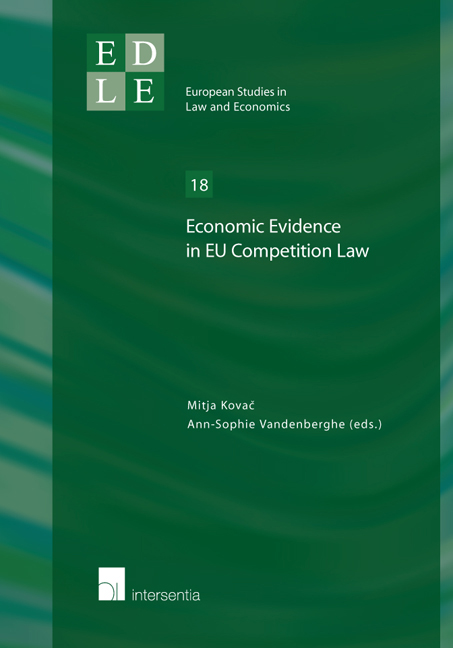Book contents
- Frontmatter
- Dedication
- Preface
- Contents
- List of Contributors
- General Introduction
- PART I ECONOMIC METHODS IN COMPETITION LAW
- PART II ECONOMIC EVIDENCES IN COMPETITION LAW
- PART III INSIDER TRADING, CARTELS AND CRIMINALISATION
- PART IV PRELIMINARY RULINGS AND STATE AID CONTROL
- PART V ECONOMIC EVIDENCE, ENFORCEMENT PROBLEMS AND NATIONAL COURTS
- Chapter 15 Google, Competition Policy and the Owl of Minerva
- Chapter 16 The Interaction between EU Regulatory Implants and the Existing Croatian Legal Order in Competition Law
- Chapter 17 Empiric Assessment of the Role of Economic Analysis in Russian Competition Law
- Chapter 18 Challenges of Private Enforcement of Antitrust in Slovenia
- Chapter 19 On the Need of EU Wide Best Practices in Competition Law Enforcement Proceedings
- Index
Chapter 19 - On the Need of EU Wide Best Practices in Competition Law Enforcement Proceedings
from PART V - ECONOMIC EVIDENCE, ENFORCEMENT PROBLEMS AND NATIONAL COURTS
Published online by Cambridge University Press: 21 September 2018
- Frontmatter
- Dedication
- Preface
- Contents
- List of Contributors
- General Introduction
- PART I ECONOMIC METHODS IN COMPETITION LAW
- PART II ECONOMIC EVIDENCES IN COMPETITION LAW
- PART III INSIDER TRADING, CARTELS AND CRIMINALISATION
- PART IV PRELIMINARY RULINGS AND STATE AID CONTROL
- PART V ECONOMIC EVIDENCE, ENFORCEMENT PROBLEMS AND NATIONAL COURTS
- Chapter 15 Google, Competition Policy and the Owl of Minerva
- Chapter 16 The Interaction between EU Regulatory Implants and the Existing Croatian Legal Order in Competition Law
- Chapter 17 Empiric Assessment of the Role of Economic Analysis in Russian Competition Law
- Chapter 18 Challenges of Private Enforcement of Antitrust in Slovenia
- Chapter 19 On the Need of EU Wide Best Practices in Competition Law Enforcement Proceedings
- Index
Summary
INTRODUCTION
In order to establish a system that ensures the competition in the common market is not distorted, Articles 101 and 102 of the Treaty must be applied effectively and uniformly in the European Community. In order to ensure the effective enforcement of the Community competition rules and the proper functioning of the cooperation mechanisms, it is necessary to develop the best practices in international competition law enforcement proceedings.
BEST PRACTICES
The best practices should be intended to promote the adoption of procedural safeguards for all types of competition matters, directed at ensuring that due regard is given to the fundamental fairness of the processes by which the competition law is enforced in an increasingly global context. It is essential to embrace the principles of transparency, engagement, confidentiality, due process, non-discrimination and accountability in order to operate effectively. Such principles are essential not only to ensure fairness to firms being investigated, but also to more effectively pursue the policies that underlie competition laws, promote greater respect for competition law, competition authorities and their enforcement decisions.
The best practices would not only ensure procedural fairness for those involved, but would also importantly strengthen vigorous, efficient enforcement of competition laws in a number of respects. For example, frequent and open engagement with firms under investigation enhances the abilities of agencies (enforcing the competition laws) to gather relevant information, increases efficiency by the parties on the issues in which agencies are actually interested, and strengthens the internal deliberations of agencies by enabling them to better understand the firms’ arguments, and the facts that support those arguments before, rather than after, the agencies decide whether to recommend formal charges. Providing due process protections to firms under investigation enables competition authorities to ensure their decisions (even if adverse to respondents) to be respected by all parties. Thus, increased procedural fairness can strengthen agency decision-making and increase public confidence in agency decisions, benefiting businesses, competition authorities and the consumers they serve.
- Type
- Chapter
- Information
- Economic Evidence in EU Competition Law , pp. 429 - 432Publisher: IntersentiaPrint publication year: 2016

